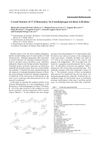 87 citations,
May 2012 in “PLOS Genetics”
87 citations,
May 2012 in “PLOS Genetics” Six new genetic regions linked to early hair loss also connect to Parkinson's disease and prostate cancer, possibly leading to new treatments.
 January 2000 in “Expert Opinion on Therapeutic Patents”
January 2000 in “Expert Opinion on Therapeutic Patents” The document highlights various patents for new compounds with potential treatments for multiple diseases, including cancer, hormonal disorders, and diabetes.
 71 citations,
January 2004 in “Dermatology”
71 citations,
January 2004 in “Dermatology” Oral finasteride works better than topical minoxidil for hair growth, both are safe.
 42 citations,
May 2003 in “Mini-reviews in Medicinal Chemistry”
42 citations,
May 2003 in “Mini-reviews in Medicinal Chemistry” New steroidal compounds could be effective for treating conditions related to 5α-reductase enzyme activity.
 January 2024 in “Reproductive toxicology”
January 2024 in “Reproductive toxicology” Hesperidin helps protect against testicular damage caused by finasteride.

Natural compounds from Chinese herbs may safely promote hair growth and treat common hair loss.
 July 2019 in “Mayo Clinic proceedings”
July 2019 in “Mayo Clinic proceedings” The man's fatigue and erectile dysfunction were improved by treating his obesity-related low testosterone without needing testosterone replacement.
 7 citations,
May 2016 in “European Polymer Journal”
7 citations,
May 2016 in “European Polymer Journal” The new nanocarriers improve how well water-insoluble drugs dissolve and allow for controlled drug release.
 3 citations,
June 2018 in “International Journal of Clinical Pharmacy”
3 citations,
June 2018 in “International Journal of Clinical Pharmacy” Baby born healthy despite mom taking finasteride, but more research needed.
 12 citations,
January 2018 in “Journal of Drug Delivery Science and Technology”
12 citations,
January 2018 in “Journal of Drug Delivery Science and Technology” The new particle system could be a promising treatment for diseases related to the 5-α reductase enzyme.
 38 citations,
June 2015 in “Expert Opinion on Therapeutic Targets”
38 citations,
June 2015 in “Expert Opinion on Therapeutic Targets” Blocking the prolactin receptor might help treat various diseases, but more research is needed.
10 citations,
February 2021 in “International Journal of Nanomedicine” Chitosan-decorated finasteride nanosystems improve skin retention and could be a better treatment for hair loss.
 13 citations,
August 2018 in “Journal of Molecular and Cellular Cardiology”
13 citations,
August 2018 in “Journal of Molecular and Cellular Cardiology” Finasteride improves heart function and repairs damage after heart attack in mice.
 January 2025 in “Heliyon”
January 2025 in “Heliyon” Tamsulosin and finasteride have similar effects on blood sugar control in men with type 2 diabetes.
 February 1999 in “Drugs in R & D”
February 1999 in “Drugs in R & D” The document concludes that various drugs for men's health issues are in development, with treatments for sexual dysfunction and prostate conditions being the most advanced.
 February 1999 in “Analytical Sciences”
February 1999 in “Analytical Sciences” A new antiandrogen compound was made and its detailed three-dimensional shape was described.
 April 2024 in “International journal of medical science and clinical research studies”
April 2024 in “International journal of medical science and clinical research studies” Effective acne management in PCOS includes hormone therapy, metformin, isotretinoin, weight loss, diet, exercise, and personalized treatment plans.
 223 citations,
December 2010 in “The Journal of Sexual Medicine”
223 citations,
December 2010 in “The Journal of Sexual Medicine” Some patients taking finasteride or dutasteride may have ongoing sexual problems and depression even after stopping the medication.
December 2024 in “Tissue and Cell” A new method helps detect androgen receptor movement in cells, aiding research on hair loss treatments.
 June 2007 in “Endocrinology and Metabolism Clinics of North America”
June 2007 in “Endocrinology and Metabolism Clinics of North America” The foreword introduces a medical issue discussing male hormonal health, treatments, and the effects of conditions like obesity and aging.
 January 2023 in “Applied sciences”
January 2023 in “Applied sciences” Gefitinib and Sasam-Kyeongokgo together significantly reduce cancer growth and improve immune response in mice.
 10 citations,
October 2010 in “International Journal of Andrology”
10 citations,
October 2010 in “International Journal of Andrology” Finasteride doesn't affect oral testosterone undecanoate, and high DHT levels may cause acne, prostate issues, and hair loss.
 30 citations,
April 1997 in “European journal of endocrinology”
30 citations,
April 1997 in “European journal of endocrinology” The document concludes that managing hirsutism involves identifying the cause, using a scoring system for severity, combining cosmetic and medical treatments, encouraging weight loss, and providing psychological support, while noting the need for more research on drug treatments.
 15 citations,
March 1997 in “International Journal of Dermatology”
15 citations,
March 1997 in “International Journal of Dermatology” Finasteride shows promise for treating hair loss and excessive hair growth, but more research is needed to confirm its effectiveness and safety.
1 citations,
December 2019 Selenium is essential for health, but too much or too little can cause problems; blood selenium levels are a good measure of intake.
15 citations,
March 2015 in “PloS one” Scientists restored fertility in male mice lacking a key fertility gene by using a modified gene.

Hormonal treatments can help with hair loss, acne, and excess hair growth, but it takes 3-6 months to see results and patients should know the possible side effects.
 1 citations,
March 2010 in “Internal medicine journal”
1 citations,
March 2010 in “Internal medicine journal” A 72-year-old man with sudden taste issues and hair growth was diagnosed with a severe stomach cancer and died within 5 months.
 50 citations,
October 2009 in “Clinical Endocrinology”
50 citations,
October 2009 in “Clinical Endocrinology” Hair loss in young men linked to higher risk of insulin resistance and metabolic issues.
 September 2024 in “Journal of Cutaneous and Aesthetic Surgery”
September 2024 in “Journal of Cutaneous and Aesthetic Surgery” Bicalutamide may help treat female pattern hair loss.

























